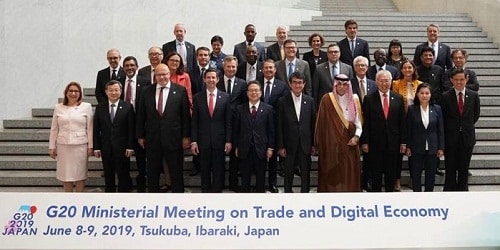The G20 Ministerial meeting on Trade and Digital Economy was held on June 8 and 9, 2019 in Tsukuba city, Ibaraki Prefecture, Japan. It is one of the eight Ministerial Meetings. Trade and Economy Ministers of the Group of 20 major economies discussed the ways to reorder trade rules and finances in an era of technological change and protectionism.
- The meetings of financial leaders was held in the southern city of Fukuoka and of economic ministers in Tsukuba, near Tokyo. In order to reach a consensus on a range of issues to be endorsed by leaders, they will meet on June 28, 29 in Osaka.
- The central bank governors and other financial regulators meeting in Fukuoka flagged risks from upsets to the global economy as Beijing and Washington clashed over trade and technology.
- Japan hosted the G-20 summit for the first time.
- The G-20 group includes Argentina, Australia, Brazil, Canada, China, France, Germany, India, Indonesia, Japan, South Korea, Mexico, Russia, Saudi Arabia, South Africa, Turkey, the United Kingdom, the United States and the European union.
Indian Delegation for G20 Ministerial Meeting was led by the Commerce Minister Piyush Goyal
The Indian delegation for G20 Ministerial Meeting was led by the Union Minister of Commerce and Industry & Railways,Piyush Goyal. He participated in the discussions related to increasing trade and cooperation to harness the potential of digital economy.
- He held the meetings with US Ambassador to World Trade Organization (WTO) Dennis Shea, China’s Vice Minister of Commerce, Wang Shouwen and Australia’s Minister for Trade, Tourism, and Investment, Simon Birmingham.
- He also held bilateral talks with Minister of Trade and Industry for Singapore, Chan Chun Sing Minister of Commerce and Investment for Saudi Arabia, Majid Bin Abdullah Al Qasabi; Minister of Trade and Industry for South Africa, Ebrahim Patel, and Minister for Trade of the Republic of Korea, Yoo Myung-Hee.
- He discussed the developments in the global trade situation, WTO matters, and digital trade.
- For the first time, Ministers of the Ministry of Electronics and Information Technology (MeitY) and Commerce participated in a joint session on Digital Economy at the G20 Ministerial Meeting
- India has started the exercise to formulate a national e-commerce policy and the 41-page draft e-commerce policy addresses six broad issues of the e-commerce ecosystem data, infrastructure development, e-commerce marketplaces, regulatory issues, stimulating domestic digital economy and export promotion through e-commerce.
India emphasized to promote MSMEs in developing countries to boost domestic and global trade
Union Minister of Commerce, Piyush Goyal pitched to promote Micro, Small and Medium Enterprises (MSMEs) in developing countries. They are important for job creation and promote trade in a sustainable manner.
- With Japan, he discussed the issues related to a proposed mega Free Trade Agreement (FTA) Regional Comprehensive Economic Partnership (RCEP).
- He held the bilateral meetings with his counterparts from various countries, including the UK, Japan, Spain, Korea, and South Africa and discussed ways to increase trade and investments.
- He also stated that free trade and investments will benefit developing countries when they remain development centric.
- Critical linkage between financial and human capital was needed to recognize in order to promote trade and investments in a sustainable and inclusive manner.
- With Liam Fox, Secretary of State for International Trade, UK, he discussed the steps to provide further impetus on trade relationship and facilitate more business and investment opportunities.
- MSMEs contribute around 45% in India’s exports, about 25% to the GDP from service activities and over 33% to the manufacturing output of India.
G-20 note expects India’s economy to grow 7.3% in 2019, 7.5% in 2020
G-20 surveillance note expected that Indian economy will grow 7.3% in 2019 and 7.5% in 2020. This was prepared by the staff of International Monetary Fund (IMF).
- It stated that the reforms to hiring and dismissal regulations would help incentivise formal job creation in India and, if combined with an increase in female labour force participation would help absorb the country’s large demographic dividend.
- Global growth is projected to remain stable at around 3.6%. It will rely on weights shifting toward countries with relatively higher growth rates, mainly G-20 emerging markets such as China and India.
About G20:
♦ Chairman: Shinzo Abe
♦ Formation: 26 September 1999




